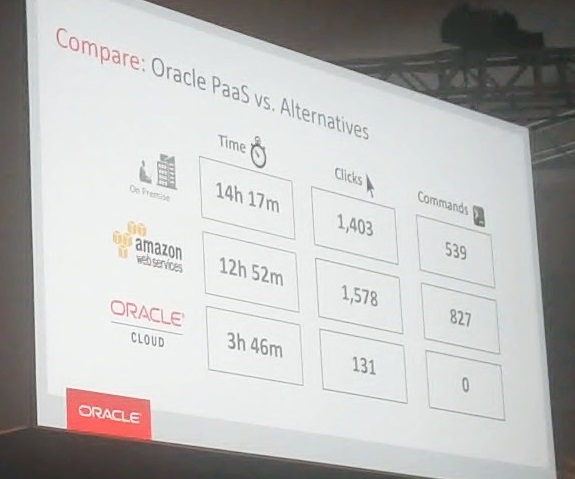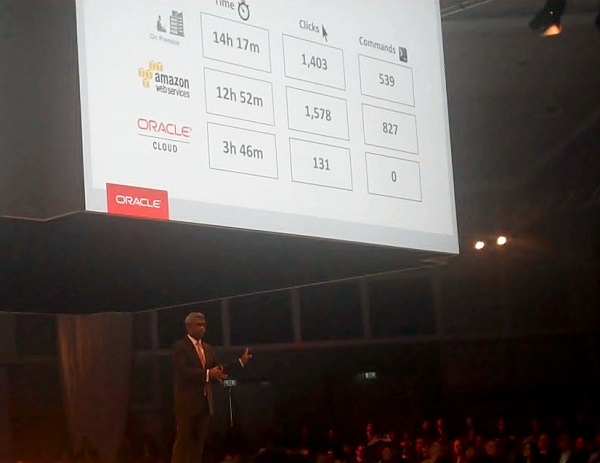 Oracle changes partner programme to pull in new channels and encourage ISVs and vertical specialists
Oracle changes partner programme to pull in new channels and encourage ISVs and vertical specialists Oracle has extended its Oracle PartnerNetwork (OPN) into the cloud and enabled lower entry points as part of a drive to pick up new partners, particularly new types of partners coming from cloud.
“Cloud is our top priority and we are aligning our resources to that strategic initiative,” said Shawn Price, senior vice president, Cloud, Oracle. New cloud designations aim to complement existing OPN program levels to provide tiers of recognition and progressive level benefits.
In addition, Oracle launched a new entry point into the OPN program called the Cloud Registered level whose members can resell Oracle Cloud Platform solutions, including Platform-as-a-Service (PaaS) and Infrastructure-as-a-Service (IaaS) solutions; they have access to the OPN Cloud Business Builder for sales, marketing and technical training and resources, as well as OPN branding. At this week's Customer event in London Oracle President Product Development, Thomas Kurian positions Oracle PaaS squarely against both on-premise and public cloud offerings in terms of ease of set-up and management (below).

Simon Hill, UK&I Alliances director tells IT Europa: “These are very exciting times – from an Oracle perspective – the integrated cloud strategy puts us in a strong position against the likes of AWS and Azure etc.”
The cloud OPN is linked to the customer proposition. “Oracle has not had a cloud programme -even though we have tens of thousands of cloud customers without one. We have collated input from partners and customers to make it comprehensive, and meet all their needs. There is now a general appreciation of our strategy. We have a strong message on SaaS, PaaS and finally Infrastructure as a service which is something unique to Oracle.”
Oracle initially saw cloud traction in enterprise; now that it has an integrated stack he says, “we are seeing partners talking to us about the Platform as a Service. They have lots of expertise and tools here, and they can see where their entry point is. A lot of technology partners are coming in as PaaS. The IaaS is interesting for hosting provider, MSPs etc.”
“All the products are linked and integrated as the partners want to offer the whole stack. We want that as much as possible. Partners are looking to embrace Oracle in a formalised way which we've not had before. Over the last three months we have talked to them less about our traditional areas of measurement and more on the move to cloud. So the partner entry points can be appreciated by the partners – not just the annual recurring revenue (ARR) gates, but other elements such as specialisations, and we have a recognition for the cloud market place so they get recognised for applications, and criteria for fixed scope and customer-repeatable solutions - very much a boost to the ISV and developer sides. Our ISV proposition is to use our PaaS with their software, or link into any of our SaaS offerings, and publish it on the cloud marketplace.”
The overall objective is to accelerate Oracle Cloud through our partners, but we are not just helping our existing partners pivot to the cloud, but we are also keen to recruit new partners - the 'born in the cloud' partners. So we have standard, select levels and then premier who are more specialist and probably regional before the top tier Elite and Global elite. The channel in future will be built around repeatable solutions, and numbers of go-lives. So we are taking the cycle from end-to-end.”
Entry requirements will be less demanding at the lower levels with no minimum ARR, this is aimed at getting new partners on board.
“The new channels will be start-ups – we are trying to capture all the up and coming channels – whether they are cloud providers, spin-offs, IT departments going independent, even our customers. The market is changing and we want to capture all the new classes”
The likely growth in early adopters is showing mostly in financial services and banking followed by retail, he says, but from a partner perspective he needs breadth and depth across all industries. “The channels key conversation is that they appreciate that the cloud is here and offerings are here, but it demands new business models and new ways of operating, not just with Oracle but also with their customers, and while there is no silver bullet, the greatest challenge is not what is the cloud or its potential but what it means to their organisations. How can they enhance their offerings for the cloud. They see it as the most important time in their history, but know they meed to take the right decisions.”
Cannibalisation of exiting business is one concern, but as part of their business planning they see the inevitability and getting the balance right, and the timing of the business model, he says. The change to sales models, back office and is all part of the evolution. Average deal sizes may be lower, but volumes higher, it may well be that some of the offerings require more standardisation which is why we are pushing fixed scope. “It is changing and we are keen to work with as many partners as possible to help them define their business models going forwards.”
The challenge of the move to cloud for channels and ISVs is one of the topics to be discussed at the European Software & Solutions Summit 2016 in London in April. ISVs, developers and strategy executives from service providers and resellers can register for free attendance here